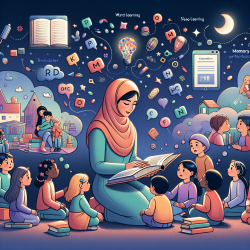In the quest to optimize children's language acquisition, the research article "Goodnight book: sleep consolidation improves word learning via storybooks" by Williams and Horst (2014) offers compelling insights. As a practitioner focused on data-driven decisions, integrating the findings of this study into your practice can significantly enhance outcomes for young learners. Here, we will explore the key findings and practical applications to improve word learning in children through storybook reading and sleep consolidation.
Key Findings
The study conducted by Williams and Horst (2014) investigated how repeated readings of storybooks and subsequent sleep affect word learning in preschool children. The research revealed two main points:
- Repeated readings of the same storybook significantly enhance word learning.
- Sleep shortly after learning further consolidates memory, leading to better word retention.
Children who napped after hearing different stories performed as well as those who repeatedly heard the same story and did not nap. This finding underscores the powerful role of sleep in memory consolidation.
Practical Applications
Based on these findings, here are actionable steps you can take to enhance word learning in children:
1. Incorporate Repeated Readings
Ensure that children hear the same story multiple times. This repetition helps reduce cognitive load and allows children to focus on learning new words.
2. Schedule Learning Before Naps
Plan storybook reading sessions right before nap time. This timing allows the newly learned words to be consolidated during sleep, enhancing retention.
3. Monitor and Encourage Enjoyment
Children’s enjoyment of the stories plays a crucial role in their engagement and learning. Use a simple rating system to gauge their enjoyment and adjust story selections accordingly.
Encouraging Further Research
While the study provides valuable insights, it also opens avenues for further research. Consider exploring:
- The impact of different types of stories (e.g., fiction vs. non-fiction) on word learning.
- How varying lengths of nap times affect word retention.
- The role of other factors such as background noise during story reading sessions.
Engaging in or supporting further research can help refine these strategies and uncover additional methods to enhance language acquisition in children.
Conclusion
Integrating repeated storybook readings and strategic nap times into your practice can significantly boost children's word learning and retention. These data-driven strategies are not only effective but also enjoyable for the children, making them a win-win for educators and learners alike.
To read the original research paper, please follow this link: Goodnight book: sleep consolidation improves word learning via storybooks.










